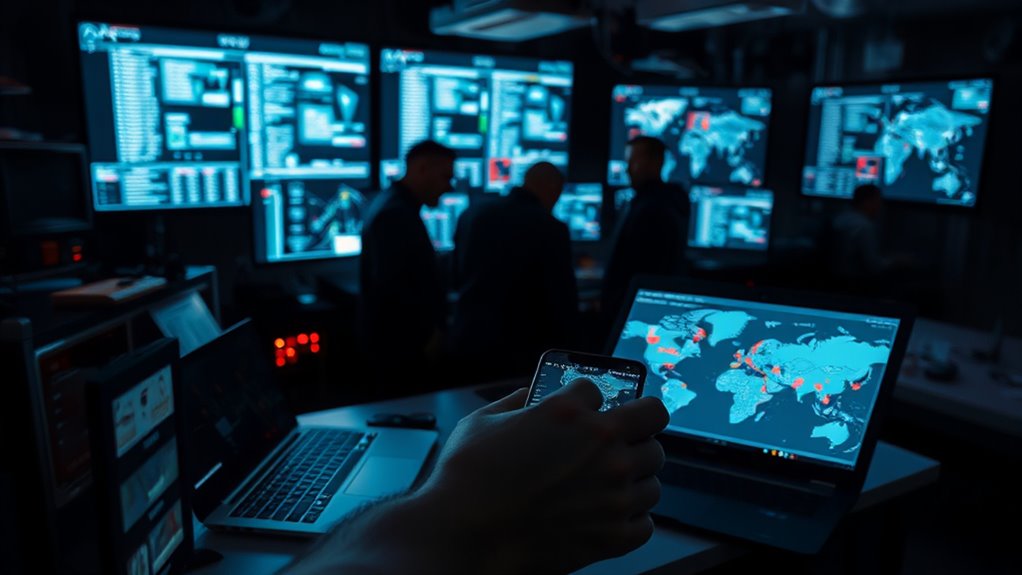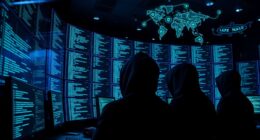The China espionage threat greatly endangers U.S. national security, targeting sensitive data and critical infrastructure. Through cyber intrusions, like spear phishing and exploitation of devices such as TikTok, they’re managing to gather extensive intelligence. Intellectual property theft costs the U.S. economy up to $600 billion annually, weakening innovation. To combat this, robust counterintelligence efforts and education on their tactics are essential. There’s much more to uncover about this pressing issue and its implications.
Key Takeaways
- Chinese cyber espionage targets sensitive U.S. data through methods such as spear phishing and infrastructure threats.
- Annual losses from Chinese intellectual property theft cost the U.S. economy between $200 billion to $600 billion.
- Counterintelligence measures are essential to protect U.S. interests from growing Chinese cyber and human infiltration.
- Vulnerabilities in U.S. critical infrastructure, like water and electric grids, increase risks from sophisticated Chinese cyber attacks.
- China’s state-sponsored espionage aligns with national goals, leveraging advanced technology and programs like the Thousand Talents Program to enhance capabilities.
Cyber Espionage and National Security

As cyber threats continue to evolve, you can’t ignore the significant implications of Chinese cyber espionage on national security. This form of espionage primarily utilizes cyber intrusions, targeting sensitive data through methods like spear phishing.
It poses a direct threat to critical infrastructure, risking potential physical attacks via connected devices. You should be concerned about how data from Chinese-made devices and apps—like TikTok—can be exploited for surveillance and espionage.
The long-term impact of these activities could weaken U.S. national security, especially considering the frequency and scale of cyber incidents attributed to China. Staying aware of these threats is essential for safeguarding both your personal information and the broader security landscape.
Economic Espionage and Intellectual Property Theft

While many might overlook the economic implications of espionage, Chinese intellectual property theft poses a serious threat to the U.S. economy. Annual losses range from $200 billion to $600 billion, costing the average American family up to $6,000 after taxes.
With over 60 documented cases of espionage linked to China since 2021, around 80% of these prosecutions benefit Chinese interests. Cyber tools enhance these efforts, with 46% of incidents involving cyber espionage.
The focus lies on acquiring commercial and military technologies, aiming to boost China’s global competitiveness. This ongoing theft not only disrupts innovation but also undermines U.S. economic dominance, creating long-term disadvantages that can stifle growth for American families and businesses alike.
Counterintelligence Efforts Against Chinese Espionage

The ongoing threat from Chinese espionage demands robust counterintelligence efforts to protect U.S. interests.
The escalating threat of Chinese espionage necessitates strong counterintelligence measures to safeguard U.S. interests.
You’ll find that the U.S. faces a growing challenge from both cyber and human infiltration, targeting national security organizations.
Intelligence sharing among U.S. agencies and international partners is imperative to counter these threats effectively. Legislative actions have been enacted to limit Chinese access to sensitive information, while enhanced cybersecurity measures are essential for safeguarding data.
Educating potential targets, like service members, about Chinese tactics is important for awareness.
Furthermore, international cooperation to share intelligence on espionage methods strengthens the overall defense against these operations, ensuring a united front in safeguarding national security and economic interests.
Operational Tactics Employed by China

China’s operational tactics in espionage are marked by a blend of advanced technology and strategic intent, making them formidable.
You’ll notice their cyber capabilities, including zero-day exploits and virtualization attacks, which target high-value networks. They harness artificial intelligence to enhance data processing and intelligence gathering, while advanced reconnaissance techniques gather crucial information across digital and physical domains.
Often state-sponsored, these efforts align with national goals, encompassing both commercial and military interests. You’ll see a reliance on the overwhelming volume of operations, often involving citizen participation, making detection challenging.
In addition, programs like the Thousand Talents Program recruit experts globally, strengthening China’s technological edge and expanding its influence. Their tactics evolve continuously, adapting to maintain strategic advantages.
Impact on U.S. Critical Infrastructure

As vulnerabilities in U.S. critical infrastructure grow, the threat posed by Chinese espionage becomes increasingly alarming.
Your water supply, electric grids, and transportation networks are all at risk from cyber threats, particularly from Chinese-made devices that lack proper encryption. These vulnerabilities can lead to dangerous disruptions, affecting public safety and essential services.
Critical infrastructure like water supplies and electric grids face serious cyber threats from inadequately secured Chinese-made devices.
State-sponsored actors like Volt Typhoon infiltrate systems using sophisticated techniques, often evading detection. Imagine the consequences if compromised cameras are used to trigger false alarms or disable safety measures.
The potential for panic and economic fallout looms large, with risks to human life if critical services fail. Addressing these threats is crucial to protect national security and maintain public confidence in infrastructure reliability.
Targeting of International and Academic Institutions

With critical infrastructure under threat, attention shifts to how international and academic institutions are being targeted by espionage activities.
China actively seeks to steal research and intellectual property from universities, often using graduate students and researchers for its intelligence operations. This has led to increased scrutiny from the FBI and federal agencies, raising concerns about potential racial profiling and the impact on U.S. scientific collaborations.
Meanwhile, cyberattacks against international institutions aim to benefit Chinese industry and influence global politics. These actions undermine trust and cooperation among international partners, posing significant threats to global security and economic stability.
As you navigate this landscape, awareness and vigilance become essential in protecting sensitive information and fostering secure collaborations.
Frequently Asked Questions
How Can Individuals Protect Themselves From Chinese Espionage Tactics?
To protect yourself from espionage tactics, start by using encrypted communication for sensitive information.
Maintain strong, unique passwords for all your accounts and be vigilant about potential insider threats.
Recognize social engineering tactics and resist coercion attempts.
When traveling, be cautious with any sensitive data.
Regularly monitor your online activities for suspicious behavior and report any odd occurrences to authorities.
Staying informed and proactive is key to safeguarding your personal and professional information.
What Role Do Technology Companies Play in Countering Espionage?
Technology companies play an essential role in countering espionage by implementing robust security measures.
You can expect them to enhance employee screening processes, limiting access to sensitive information. They often collaborate with government agencies to raise awareness and share best practices.
By adopting advanced technologies and industry standards, these companies strengthen their defenses, ensuring that vulnerabilities are minimized.
Ultimately, their proactive approach helps protect both their assets and the broader technological landscape.
Are There Specific Industries More Vulnerable to Chinese Espionage?
Did you know that nearly 60% of companies in the finance sector have reported data breaches?
When you consider the specific industries more vulnerable to espionage, finance, healthcare, and manufacturing stand out. These sectors often hold sensitive data and advanced technologies that attract malicious actors.
Critical infrastructure also comes under threat, as disruptions here can have severe consequences.
Awareness and robust security measures are essential to protect against these increasing vulnerabilities.
How Does China’S Espionage Impact U.S. Foreign Relations?
China’s espionage greatly strains U.S. foreign relations.
You’ll notice increased diplomatic tensions, as trust erodes between nations. Security agreements come under scrutiny, leading to cautious cooperation.
Public perception of China worsens, impacting opinion polls and societal views. In response, you might see tit-for-tat measures complicating diplomatic interactions.
What Measures Can Universities Take to Safeguard Their Research?
To safeguard your research, you can implement extensive security programs that include regular risk assessments and education on best practices.
It’s essential to establish clear disclosure requirements for foreign collaborations and monitor access to sensitive areas.
Encourage secure data storage and conduct thorough vetting of partners.
Additionally, maintain open communication about potential risks and offer training on identifying suspicious activities.
These measures help protect your intellectual property and guarantee compliance with regulations.
Conclusion
In a world where innovation drives progress, the shadow of China’s espionage looms large, threatening both national security and economic stability. While you pursue breakthroughs in technology, you must also guard against the silent theft of your ideas. Balancing collaboration with vigilance becomes essential, as the line between partnership and competition blurs. As you navigate this complex landscape, remember that protecting your intellectual property isn’t just about defense; it’s an important investment in your future.









